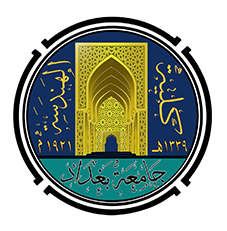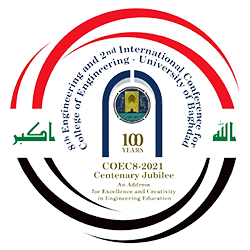Conference Tracks and Specialties
The track covers the specialties of Civil, Surveying, Water Resources, and Architectural Engineering. These specialties include, but not restricted to, the following lines of researches:
- Pre-Stressed Concrete Structures
- Rehabilitation of Existing Structures
- Strengthening of Concrete Structures with FRP
- Nonlinear Analysis of Structural Concrete Members
- Deep Foundation Engineering
- Sustainability and Geoe-Nviromental Engineering
- Soil-Structure Interaction Engineering
- Infrastructure Projects under the Financial Crises.
- BIM for Construction Project Management
- Cost-Effectiveness, Feasibility and Cost-Benefit Methods.
- Management Framework of The Construction Projects
- Decision Making in Construction Projects
- Pavement Engineering
- Traffic Engineering
- Sustainable Pavements
- Surface Water Quality Modeling and Control
- Solid Waste, Sewage and Industrial Treatment Management
- Water Treatment Plant Management
- Sustainable Process Engineering
- GIS and Remote Sensing Techniques Application
- Sustainable and Green Concrete
- Construction Materials
- Durability of Concrete
- Nanotechnology in Concrete
- Geodesy
- Photogrammetry
- Laser Scanning
- Remote Sensing
- Cartography
- Geographic Information System
- Hydraulics
- Hydrology
- Groundwater
- Irrigation and Drainage
- Hydraulic Structures
- Management of Water Systems
- Architecture and Environment
- Technology of Architecture
- Theory of Architecture
- Urban Design
The track covers the specialties of Mechanical, Energy, and Aeronautical Engineering. These specialties include, but not restricted to, the following lines of researches
- Fluid Flow and Heat Transfer Applications
- New and Renewable Energies
- Phase Change Flow and Heat Transfer
- Aerodynamics, Aircraft Design, and Jet Propulsion
- Computational Fluid Dynamics CFD
- Elasticity, Plasticity, and Stress Analysis
- Vibrations, and Structural Dynamics
- Control and Measurements
- Biomedical Engineering Applications
- Composite Materials
- Production and Manufacturing Processes
- Engineering Materials and Metallurgy Engineering
- Industrial Engineering
The track covers the specialties of Electrical, Electronics & Communication, and Computer Engineering. These specialties include, but not restricted to, the following lines of researches:
- Control Engineering, Robotics, and Artificial Intelligence Applications
- Parallel and Distributed Computer Systems
- IOT Technologies and Applications
- Network Virtualization and Cloud Computing
- Signal, Image, and Video Processing
- Power System Engineering and Harmonics
- Fault Detection and Protection Strategies
- Technologies of HVDC and FACTS Devices
- Power Transmission System Technology
- Electrical Machines Design and Control
- Power Electronics for AC and DC Drives
- Digital Systems Design
- Reversible and Quantum Logic
- Nano Electronics
- Analog and Mixed Signal Electronics
- Cognitive Radio
- Millimeter and Microwaves Technology and Applications
- Communications Networks, Technology, and Security
- Antennas
- Optical Communications and Optical Electronics
- 5G and Beyond Wireless Networks
The track covers the specialties of Chemical, Petroleum, and Environmental Engineering. These specialties include, but not restricted to, the following lines of researches:
- Petroleum and petrochemical industry
- Pharmaceutical industries
- Electrochemical processes and chemical corrosion
- Biochemical processes
- Preparation and use of catalysts
- Water pollution and treatment technologies
- Soil and ground water pollution
- Air pollution and control
- Solid waste management and landfills
- Renewable energies and sustainability
- Reservoirs engineering
- Drilling engineering
- Oil production engineering
- New technologies in petroleum engineering
- The economics of fuel utilization
Publication Fees
The publication fee is 150 USD.
Payment method: To be announced later.
Review Policy
Plagiarism: All submitted papers are checked for similarity using Turnitin plagiarism software.
The conference ensures that unbiased consideration is given to all papers regardless of race, gender, religious belief, ethnic origin, citizenship or political philosophy of the authors.
Review process: All submitted papers are sent to three reviewers to undergo a double-blind peer review process. At least two responses should be received for the decision to be taken.
Double-blind review. The paper selection will follow a double-blind review process, meaning that both the authors and reviewers will remain anonymous during the paper selection process.
All authors MUST adhere to the following guidelines to conceal their identity:
• Do NOT include any authors’ information such as name, affiliation, e-mail, etc. in the initial manuscript.
• Do NOT include any grant information or personal acknowledgments in the initial manuscript.
• All references including authors’ previous work should be referred to as 3rd-persons’ works. Work that is substantially related to the submission and has been submitted to another Conference/Journal, but has not been published yet, must be cited in an anonymized format.
[Wrong] “This paper proposes a new method to improve our previous method [1].” Reviewers can identify the authors via reference [1]!
[Correct] “This paper proposes a new method to improve XXX’s method [1].” Manuscripts that are not properly anonymized cannot be considered for review.
In order to ensure compliance with the double-blind rules, please carefully review your initial manuscript prior to submission.
Note: First submissions not meeting these rules may be returned to authors without review.

